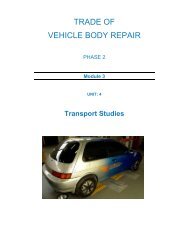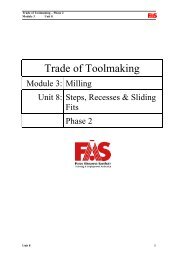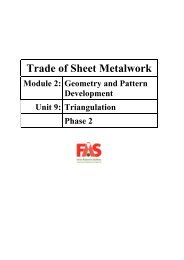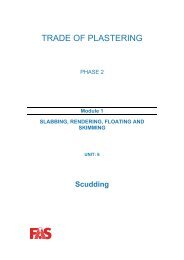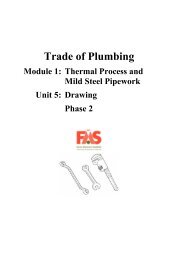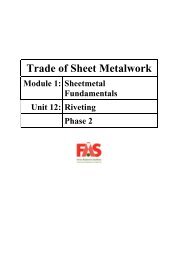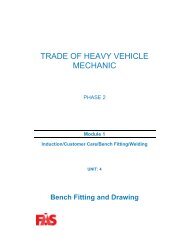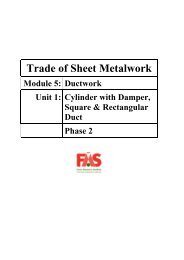Trade of Motor Mechanic - eCollege
Trade of Motor Mechanic - eCollege
Trade of Motor Mechanic - eCollege
You also want an ePaper? Increase the reach of your titles
YUMPU automatically turns print PDFs into web optimized ePapers that Google loves.
Module 4 - Unit 1<br />
<strong>Trade</strong> <strong>of</strong> <strong>Motor</strong> <strong>Mechanic</strong> - Phase 2 Course Notes<br />
•<br />
•<br />
•<br />
•<br />
•<br />
24<br />
Basic Ignition Systems<br />
Reduction <strong>of</strong> in-cylinder temperatures (such as through<br />
cooling or compression ratio reduction).<br />
Retardation <strong>of</strong> spark plug ignition.<br />
Adding water in the form <strong>of</strong> vapour in the air intake.<br />
Proper combustion chamber design which concentrates<br />
mixture near the spark plug and generates high turbulence to<br />
promote fast even burning.<br />
Use <strong>of</strong> a spark plug <strong>of</strong> colder heat range in cases where the<br />
spark plug insulator has become a source <strong>of</strong> pre-ignition<br />
leading to detonation.<br />
Correct ignition timing is essential for optimum engine performance<br />
and fuel efficiency. Modern automotive engines have sensors that<br />
can detect knock and delay the spark plug firing to prevent it,<br />
allowing engines to safely use petrol <strong>of</strong> lower octane ratings, with<br />
the consequence <strong>of</strong> reduced power and efficiency.<br />
A knock sensor consists <strong>of</strong> a small piezoelectric microphone on the<br />
engine block, connected to the engine's electronic control unit.<br />
Pre-Ignition<br />
Detonation, as previously explained, is a different phenomenon<br />
from pre-ignition, which occurs when the air/fuel mixture in the<br />
cylinder (or even just entering the cylinder) ignites before the spark<br />
plug fires. Pre-ignition is accompanied by a loud hacking noise and<br />
caused by an ignition source other than the spark. Heat can buildup<br />
in the engine intake or cylinder components due to improper<br />
design e.g. spark plugs with too low a heat rating, carbon deposits<br />
in the combustion chamber, or also due to overheating <strong>of</strong> the<br />
air/fuel mixture during compression. This heat build-up can only<br />
be prevented by eliminating the overheating (through redesign or<br />
cleaning) or the compression effects (by reducing the load on the<br />
engine or temperature <strong>of</strong> intake air). As such, if pre-ignition is<br />
allowed to continue for any length <strong>of</strong> time, power output reduces<br />
drastically and engine damage can result.<br />
Revision 2.0 July 2007



